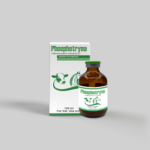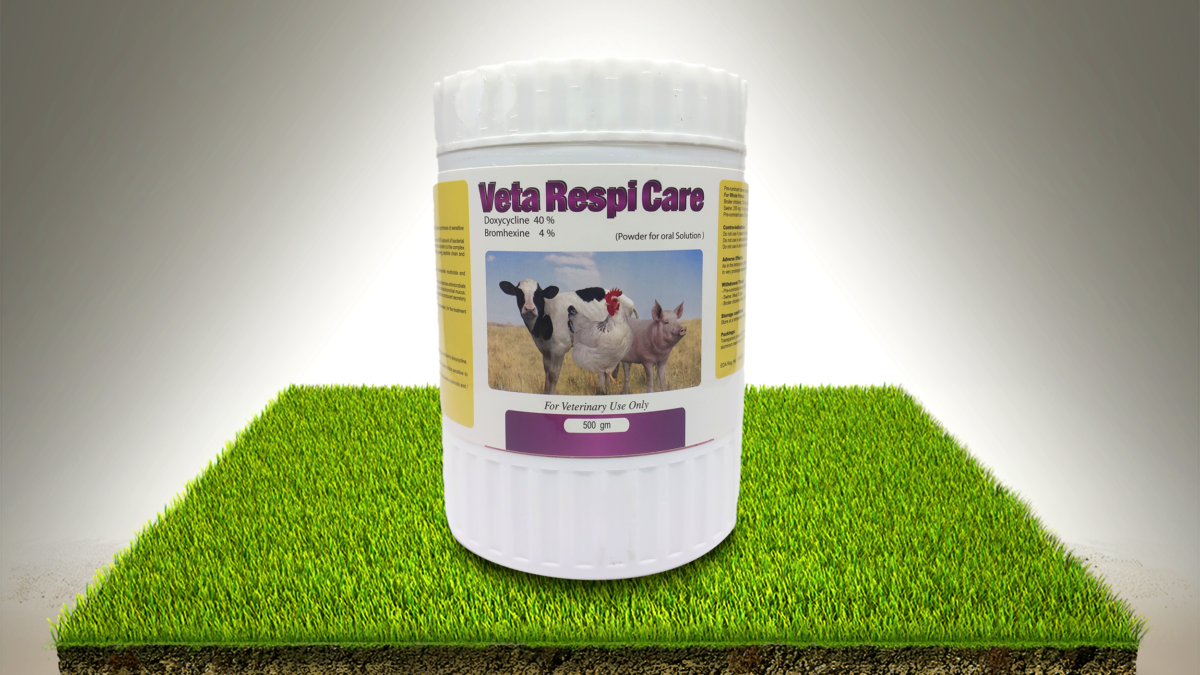
Phosphotryna

Ampivetox 50%
Powder for oral Solution
For Veterinary Use Only
Composition:
Each 1 gm contains:
Doxycycline (in the form of Doxycycline Hyclate) 400 mg
Bromhexine (in the form of Bromhexine Hydrochloride) 40 mg
Properties:
Doxycycline is a bacteriostatic antibacterial that acts by interfering with the bacterial protein synthesis of sensitive species.
Doxycycline is a semisynthetic tetracycline derived from oxytetracycline that acts on the 30 S subunit of bacterial ribosome, which it binds reversibly, blocking the binding of the aminoacyl-ARMt (RNA from transfer) to the complex formed by mRNA and ribosomes, preventing the addition of new amino acids to the growing peptide chain and interfering with it in the synthesis of proteins.
It is active against Gram-positive and Gram-negative bacteria.
Its antibacterial spectrum includes: Mycoplasma spp., Bordetella bronchiseptica, Pasteurella multocida and Mannheimia haemolytica.
Bromhexine is a benzylamine with expectorant properties. It is used alone or combined with substances antimicrobials for the treatment of respiratory diseases when production is affected as the viscosity of tracheobronchial mucus.
Bromhexine increases the volume of bronchial secretion, modifies the mucopolysaccharides produced secretory cells, reduces mucus viscosity and increases the activity of tracheobronchial cilia.
The medicine involves the combination of an antibiotic (doxycycline) and a mucolytic (bromhexine), for the treatment of respiratory disease.
Indications:
Broiler chickens:
Treatment of chronic respiratory disease and mycoplasmosis caused by Mycoplasma spp. sensitive to doxycycline.
Pre-ruminant calves:
Treatment of respiratory infections caused by Pasteurella multocida and Mannheimia haemolytica sensitive to doxycycline.
Swine: Treatment of respiratory infections caused by Mycoplasma hyopneumoniae, Pasteurella multocida and / or Bordetella bronchiseptica sensitive to doxycycline.
Target Species:
Broiler chickens, pre-ruminant calves and swine.
Dosage & route of administration:
Route of administration:
Broiler chickens and swine: administration in drinking water.
Pre-ruminant calves: administration in milk.
For Whole Product:
Broiler chickens: 250 mg / liter of drinkig water / day, for 4 – 5 consecutive days.
Swine: 250 mg / 10 kg live weight / day, for 4 – 5 days.
Pre-ruminant calves: 250 mg / 10 kg live weight / day, for 4 – 5 days.
Warnings:
– Due to the probable variability (temporal, geographical) in the appearance of resistance to doxycycline in bacteria, it is recommended to carry out bacteriological sampling and sensitivity tests of microorganisms isolated from birds sick in the farms.
– A high rate of tetracycline resistance of strains of E. coli isolated in chickens has been documented.
– Avoid administration in rusty water troughs.
– Do not use in pregnant or lactating sows.
– The absorption of doxycycline can be reduced with the presence of calcium, iron, magnesium or aluminum in the diet.
– Do not administer together with antacids, kaolin and iron preparations.
– Its use is not authorized in lactating animals whose milk is destined for human consumption.
– Its use is not authorized in laying birds whose eggs are used for human consumption.
– Do not use within 4 weeks from the start of the laying.
Contra-indication:
Do not use in cases of hypersensitivity to tetracyclines, bromhexine or any excipient.
Do not use in animals with liver disorders.
Do not use in animals with functional rumen.
Adverse Effects:
As in the tetracyclines, allergic reactions and photosensitivity can appear.
In very prolonged treatments, digestive alterations due to intestinal dysbiosis may appear.
Withdrawal Period:
– Pre-ruminants calves: Meat: 16 days.
– Swine: Meat: 5 days.
– Broiler chickens: Meat: 10 days.
Storage conditions:
Store at a temperature not exceeding 30°C & Used immediately after opening and reconstitution.
Packagings:
Transparent plastic (LDPE) bag containing 100, 250, 500 and 1000 gm of the product in (HDPE) plastic jar with (HDPE) cap with aluminum seal with an outer label without Insert.




